In Kinshasa’s Saint Joseph parish on an August afternoon, a crowd gathered to give thanks: The man they had risked their lives to oust was stepping down from the presidency.
Just a week earlier, President Joseph Kabila, who has ruled the Democratic Republic of Congo for nearly 18 years, enriching himself and his family on the country’s vast natural resources, had announced he would not be standing for re-election in December. Those filling the wooden pews were one of the reasons why. Seated side by side were four of the Catholic lay leaders who organized the demonstrations many of the worshippers had participated in. Hunted by authorities for months, they came out of hiding for a service of thanksgiving—and to plot the road ahead.
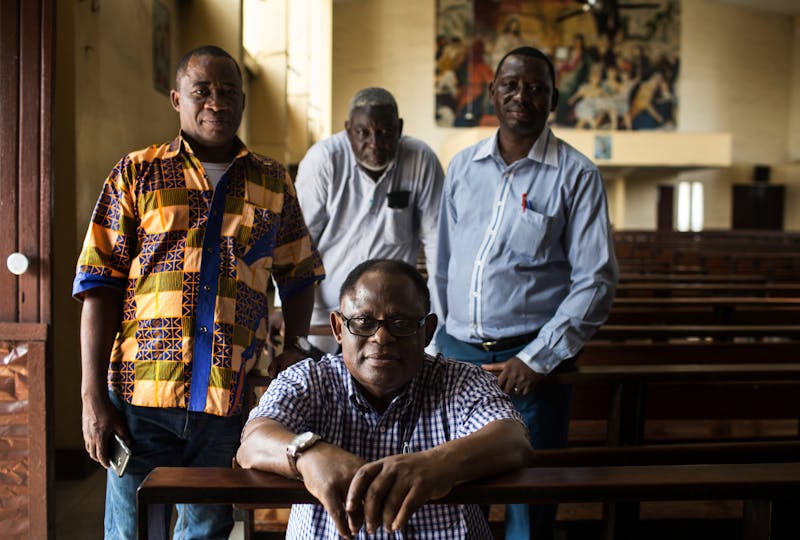
“We still have a lot to do,” their lay leader Isidore Ndaywel, a professor, urged from the pulpit following communion. In a checkered shirt and horn-rimmed glasses, he projected a mild air, but his voice boomed over the speakers. “We have to consolidate this victory with vigilance, with transparent, inclusive, and credible elections. Even if we have won this battle, this is just the first stage of the fight. In this country, the Democratic Republic of the Congo, we want the future to be different than the past.”
Congo has not seen a peaceful or democratic transition of power since it gained independence from Belgium in 1960. Under Kabila, the country has endured years of armed conflict and humanitarian crisis, its citizens among the poorest in the world. And since 2016, when Kabila disregarded the constitutional term limits that should have brought his regime to an end, a coalition of activists has been fighting for democratic norms, led by what elsewhere would seem an unexpected institution: the Catholic Church. Having won a spectacular victory in August with Kabila’s concession, those activists now face a new test—as Ndaywel predicted at the service. On December 23, DRC is scheduled to hold elections. Kabila’s chosen successor, former interior minister Emmanuel Ramazani Shadary, oversaw a bloody crackdown on the Catholic-organized protests. To the opposition, he represents a continuation of Kabila’s corruption and oppression. They fear the vote will not be a fair contest.
Since the country’s first prime minister was deposed and killed with U.S. and Belgian support shortly after independence, the DRC has suffered from a series of plunderous dictators. Mobutu Sese Seko, a kleptocratic ruler who enjoyed strong Western support as he changed the country’s name to Zaire and implemented one-party rule, brought the nation close to bankruptcy during nearly four decades in power. The current president’s father, Laurent-Désiré Kabila, overthrew Mobutu in 1997, but didn’t usher in stability. Another war soon broke out, drawing in the entire region and killing millions through violence, starvation, and disease. In 2001, the elder Kabila was assassinated. His son Joseph, then just 29, took his place, winning elections twice, though the second vote was marred by allegations of fraud. But while the war officially ended in 2003, fighting continues, with dozens of rebel groups operating in the country and millions suffering from the violence. Conflict has hampered efforts to contain a worsening Ebola outbreak in the country’s east.
In an increasingly dysfunctional state crippled by corruption and conflict, the Catholic Church has become one of the country’s few effective institutions. Nearly half of the DRC’s population of 80 million is Catholic, and the Church provides education and healthcare to millions. It has also long played a political role. In the twilight of Mobutu’s regime in the 1990s, Church leaders participated in efforts to reform the government and chart a path toward a democratic transition. When Mobutu resisted, a group of Catholic activists known as the Lay Coordination Committee (known by the French acronym CLC) organized a massive protest in support of reform, assembling at the same St. Joseph parish where the group gathered in August. The army attacked that protest, killing dozens.
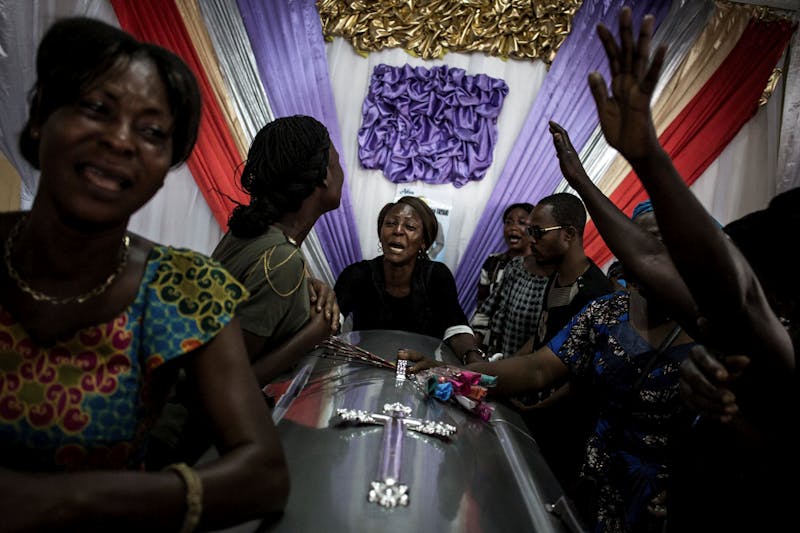
In late 2016, the country’s conference of bishops negotiated a deal between Kabila and the opposition, known as the St. Sylvester Accord, in which the president agreed to hold a vote to choose his successor by December 2017. That election never happened. In response, Catholic activists resurrected the CLC and called for nationwide protests against Kabila’s power grab. Thousands of the faithful answered the call in three protests in December 2017, January 2018, and February 2018, spilling out of parishes from Kinshasa to Goma after services and taking to the streets. Security forces met them with tear gas and bullets, killing at least 18 people and wounding dozens more. But the pressure worked, protests within and strong diplomatic pressure from without leading to Kabila’s August announcement.
In some places, such explicit political intervention by a religious institution would draw cries of protest. For Father Joseph Musubao, an assistant priest at St. François de Sales parish in Kinshasa, however, it is the Church’s duty to oppose a regime that is causing God’s people to suffer. During his January 21 homily ahead of the second of the CLC’s three protests, he told his congregation that the church had three tasks: to announce the good news of the gospel, to denounce evil, and to reject corrupt powers. In the eyes of the round-faced priest, that mission didn’t just justify the protests, but nearly compelled Christians to take part. “They have to put into practice the gospel we are preaching to them,” he told me, “the gospel which says that a person created by God should live happily on this earth, and that the wealth and resources that God has given to every nation should be shared equally and should not belong to a minority that takes millions of people hostage.”
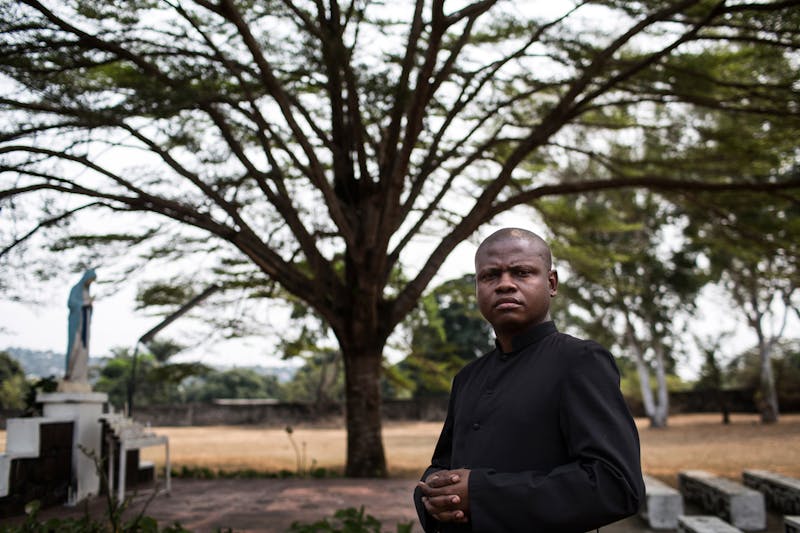
Despite the violent crackdown on a protest weeks earlier, at least a thousand people gathered in the parish yard after his sermon, singing as they marched out the gate. They made it no further than the steps, Musubao told me, when the police stationed outside fired a volley of tear gas. The crowd retreated into the parish compound, but soon a police vehicle appeared at the gate, and an officer leapt to the gun mounted on top. He fired into the crowd. The bullets struck Thérèse Dechade Kapangala, an aspiring nun and Musubao’s niece. She died instantly.
Musubao spent nearly three weeks trying to retrieve her body from a government morgue, where officials were loathe to release evidence of a government crime. Musubao no longer lives at home or preaches in his parish, due to threats, but he still believes in the cause: “We don’t have the right to abandon God’s people in their problems,” he said. “If we do, we will be bad shepherds.”
The government contends that the Church is serving the interests of foreign powers who want to exploit Congo’s resources and its people. “Some of them are, you know, agents of some influence groups abroad. Those who were colonial agents, now they are becoming … agents of neo-colonial powers,” Minister of Communication Lambert Mende told me, referring to the Church’s historic cooperation with Belgian colonizers. “If they want to gain influence, let them remove their status of bishops, and become politicians. And we [will] run together and we shall see who will win elections.”
In early December, the European Union renewed sanctions imposed on Shadary, Kabila’s chosen successor, for serious human rights violations. A loyalist with little support of his own, Shadary’s election would likely allow Kabila to maintain power, possibly until another presidential run in 2023, since DRC only limits consecutive terms. In recent interviews, Kabila refused to rule out another run.
The CLC, many of whose members continue to live in hiding, has not called a protest since February. Some pro-democracy activists have criticized the choice. There has been disagreement within the CLC itself, as well.
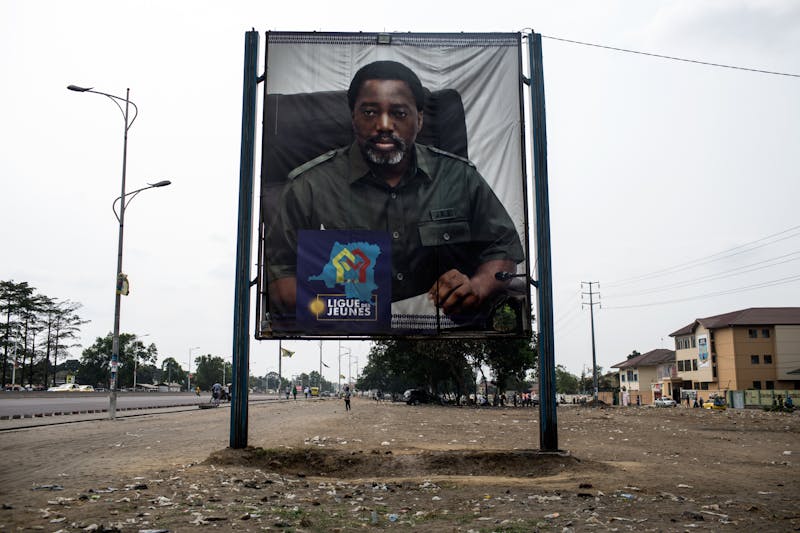
Leonie Kandolo, one of two members who have since split from the eight-person committee, was unable to attend her brother’s funeral due to threats to her safety, and hasn’t seen her children all year. She would like to see more action, and more collaboration with pro-democracy activists. “Since April, May, till today, what kind of action have they taken?” An election, without real change, is not enough, she said. “We have to reach the level of changing the system. We have to uproot the system.”
An agreement among opposition parties to unite behind a single candidate collapsed almost before the ink was dry, and two opposition figures are now facing off against each other. Shadary, meanwhile, is making transparent appeals to Catholic voters. He kicked off the official campaign period by attending Mass in Kinshasa’s Notre Dame Cathedral on November 24, and used an image of Pope Francis on a campaign poster that described Shadary as a “practicing Catholic.”
Opposition parties and activists want the election commission to cancel the planned use of electronic voting machines on December 23, which they fear will make it easier for the government to rig the vote or will cause technical difficulties that will mar the election. They also decry irregularities in the voter roll, the disqualification of two of the strongest opposition candidates, and continuing deadly crackdowns on protests and even on campaign events. Security forces killed at least seven opposition supporters, wounded 50, and arrested dozens more while dispersing opposition campaign events earlier this month, sometimes with live ammunition and tear gas. The opposition is pressing ahead with the vote.
The Church, having pressed Kabila to hold elections, was loath to then suggest a delay in the electoral calendar. But in addition to a cautionary statement from Congo’s national bishops’ conference in November, urging the country to “avoid a parody of an election,” the Church is sending thousands of election observers to watch for problems at the polls, and CLC members say they are determined to keep up the fight for real change, whatever it takes.
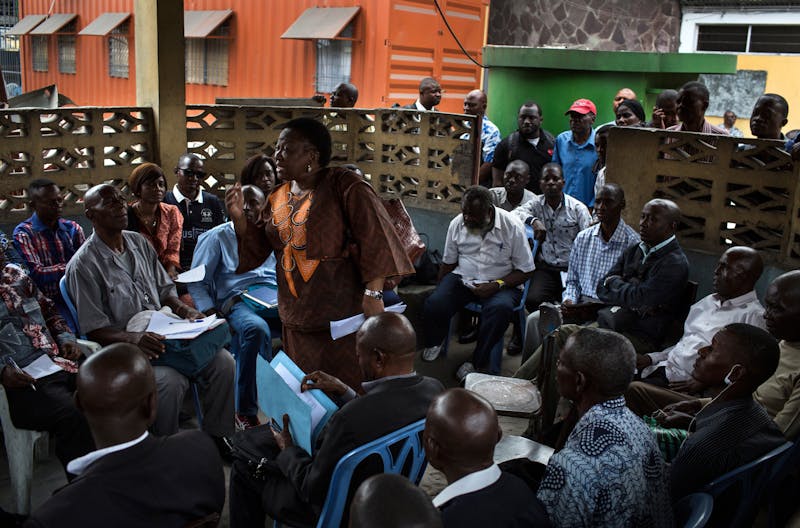
CLC member Gertrude Ekombe has not gone home or to work since January. She and the others are tired, under financial pressure, and missing their families. “Sometimes you get discouraged when you get phone calls from your kids saying they’ve seen suspicious people around the compound,” she said in August. But if the election is not fair, “we’ll keep on doing protests. If we have to die, we are ready to die.”
The International Women’s Media Foundation supported both the reporting and photography for this story as part of its African Great Lakes Reporting Initiative.



















